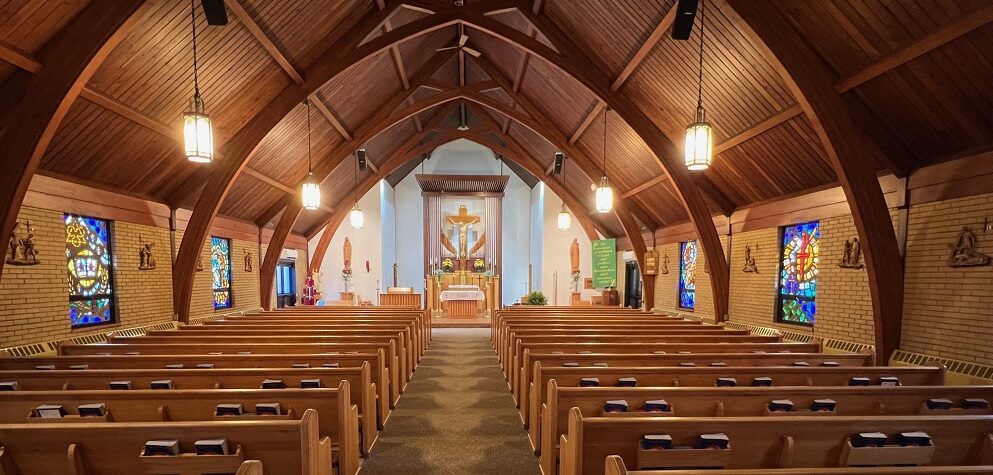The Holy Eucharist is the Sacrament that completes the Christian Initiation into the Catholic faith. Through this sacrament, we participate with the whole faith community of believers, the Church, in the Lord’s own sacrifice. It is the sacrament of the Precious Body and Blood of Christ in which he is present under the forms of bread and wine: Jesus giving himself to us as our food and drink for eternal life in the Kingdom of Heaven. Eucharist derives from the Greek word meaning “thanksgiving”. The sacrament is so called because when Christ instituted it, He gave thanks. Today, it is the chief means by which we give thanks to God, through the Holy Sacrifice of the Mass.
The Holy Eucharist is also called the Blessed Sacrament, because it is the most excellent of all sacraments. It gives us Christ Himself. “My delight is to be with the children of men” (Proverbs 8:31). It is called the Sacrament of the Altar, because it is consecrated and reserved upon an altar. It is offered up on the altar in the Holy Sacrifice of the Mass. The Holy Eucharist is called Holy Communion when it is received, usually in church. It is called Holy Viaticum when it is received during a serious illness, or at the hour of death.
“What you see is the bread and the chalice; that is what your own eyes report to you. But what your faith obliges you to accept is that the bread is the body of Christ, and the chalice is the blood of Christ. This has been said very briefly, which may perhaps be sufficient for faith; yet faith does not desire instruction.” ― Saint Augustine of Hippo
Bread of Heaven: What is the Eucharist? (3:58)
How is Christ really present in the Eucharist?
By the power of the Holy Spirit, Christ is present in the proclamation of God’s Word, in the Eucharistic assembly, in the person of the priest, but above all and in a wholly unique manner in the Eucharist. “This presence is called ‘real’—by which is not intended to exclude the other types of presence as if they could not be ‘real’ too, but because it is presence in the fullest sense: that is to say, it is a substantial presence by which Christ, God and man, makes himself wholly and entirely present” (CCC, no. 1374, citing Pope Paul VI, Mystery of Faith, no. 39).Since the Middle Ages, the change of bread and wine into the Body and Blood of Christ has been called “transubstantiation.” This means that the substance of the bread and wine is changed into the substance of the Body and Blood of Christ. The appearances of bread and wine remain (color, shape, weight, chemical composition), but the underlying reality—that is, the substance—is now the Body and Blood of Christ.
“When you look at the crucifix, you understand how much Jesus loved you then. When you look at the Sacred Host, you understand how much Jesus loves you now.” ― Saint Teresa of Calcutta
Holy Eucharist Prayer
Lord, purify my conscience for the sake of the purest love. May the Church present to the world the witness of sincere love, so that all people may be drawn to the Holy Eucharist to learn the true meaning of good and evil, and discover here the fullness of love. Amen.
